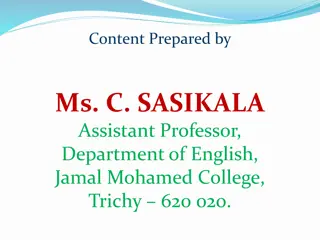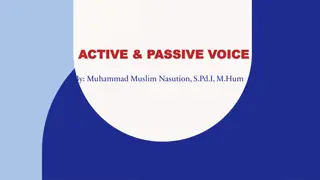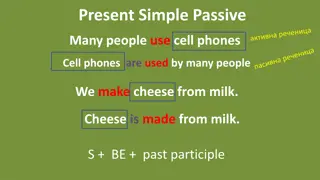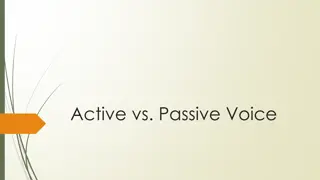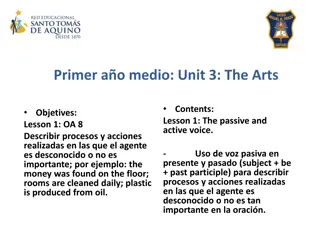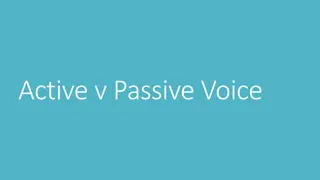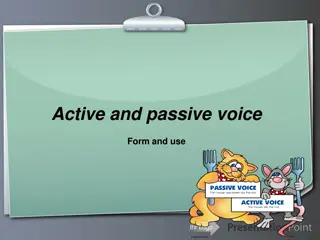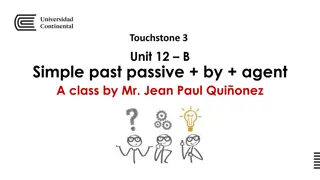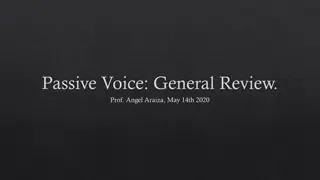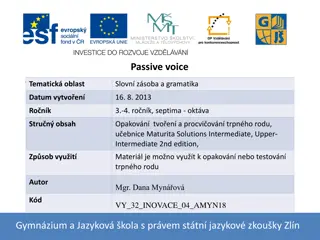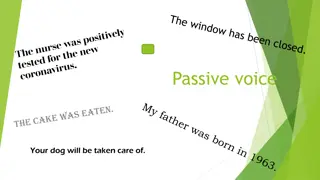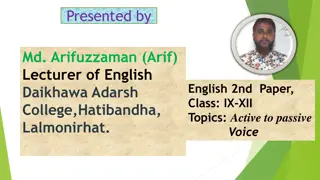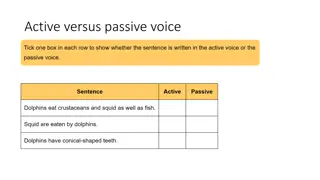Mastering Active and Passive Voice in English: A Comprehensive Guide
Explore the fundamental concepts of active and passive voice in English through this detailed guide. Learn how to identify and transform sentences from active voice to passive voice, understand the usage of auxiliary verbs, and practice changing sentence structures effectively. Enhance your language skills and grasp the nuances of voice changes for improved communication.
Download Presentation

Please find below an Image/Link to download the presentation.
The content on the website is provided AS IS for your information and personal use only. It may not be sold, licensed, or shared on other websites without obtaining consent from the author.If you encounter any issues during the download, it is possible that the publisher has removed the file from their server.
You are allowed to download the files provided on this website for personal or commercial use, subject to the condition that they are used lawfully. All files are the property of their respective owners.
The content on the website is provided AS IS for your information and personal use only. It may not be sold, licensed, or shared on other websites without obtaining consent from the author.
E N D
Presentation Transcript
Introduction Md. Hafiz Uddin Dulal Subject:English 2ndpaper Class viii,ix,x Assistant Headmaster Topics: Changing sentence Malijhikanda High School Date: . Jhenaigati, Sherpur: Mobile: 01712306321, 01971.268630 Email: hafiz279218@gmail.com
Who observe the pohela Boishakh every year? The people of Bangladesh observe the pohela boishakh every year. The day is observed with traditional festivities across the country. How is the day observed ? What kind of sentences are they? They are active voice and passive voice
Todays Lesson is voice change.
Aims : After learning this the students will be able to- a.Introduce with active voice and passive voice b.Use auxiary verb according to tense. c. Introduce with subject and object. d. Change some sentence into passive voice.
There are two kinds of voice A. Active voice B. Passive voice
Active voice Look at the sentences below. A.The boy flies a kite. B.The girls are plucking flowers. C. The dog bit the child. D. Students will make a garden in theirschool. Who do/does the work ? Defination: The person who do /does the work himself is called active voice.
Passive voice Look at sentences below A. A kite is flown by the boy. B. Flowers are being plucked by the girls. C. A garden is made in their school by the students. By whom is /are the work done ? Defination: The work which is done by someone / somebody/something is called passive voice.
How to change the sentence from active to passive ?
Structure: Object > subject +auxiliary verb + past participle of verb + extendtion + preposition ( by/to/at/with) +subject > object.
Subject I we you He She It They Object me us you him her it them subject Noun object noun
Auxilliary verb according to tense Tense Active Passive Present indefinite tense Subject+present form of verb+object Am/is/are Present continuous tense Subject+am/is/are+(verb+ing) +Object Am being/is being/are being Present perfect Subject+ have /has+ past participle of verb+ object Sbuject+past form of verb+object Have been/has been Past indefinite tense Was/were Past continuous tense Subject+was/were+(verb+ing)+ object Was being/were being Past perfect tense Subject+had +past participle of verb+object. Had been Future indefinite tense Subject+shall/will+verb(present form)+object. Shall be /will be Future continuous tense Subject+ shall be/will be+(verb+ing)+object Shall be being/will be being Future perfect tense Subject+shall have/will have+past participle of verb+object May,might,must,can,could,should,would,ought to,need,dare Shall have been/will have been Modal verb Modal verb +be
Look at the sentence how to change from active to passive A. tea is taken every morning by my grandfather. A.My grandfather takes tea every morning B.The girl was known to the man. B.The man knew the girl. C.Some steps have been taken to remove illiteracy from the society by the government. C.Government has taken some steps to remove illiteracy from the society. D. Death can not be avoided by man. D.Man can not avoid death. E. The children were making a noise. E. A noise was being made by the children.
Look at the flowing sentences and change them into passive voice. a.Suzon does not idle away his time. b. My uncle had sent a nice gift for me. c. We shall be looking after our garden. d. The girl cut her birth day cake merrily. e. You should not disobey your parents.
Match the sentences with your answers. a.Suzon s time/his time is not idled away by Suzon/him. b. A nice gift had been sent for me by my uncle. c. Our garden will be being looked after by us. d. The girl s/her birth day cake was cut by her/the girl. e. Your parents should not be disobeyed dy you.



